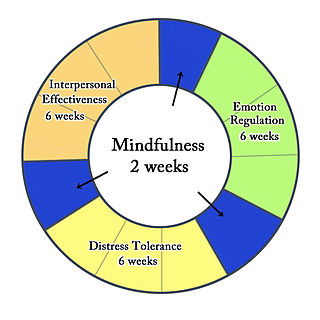
Matthias Berking (born 30 April 1971 in Pittsburgh, Pennsylvania) is a professor of psychology and a psychotherapist at the University of Erlangen. [1] [2]

Matthias Berking (born 30 April 1971 in Pittsburgh, Pennsylvania) is a professor of psychology and a psychotherapist at the University of Erlangen. [1] [2]
Berking's field of research is the regulation of emotion [ citation needed ].

Dialectical behavior therapy (DBT) is an evidence-based psychotherapy that began with efforts to treat personality disorders and interpersonal conflicts. Evidence suggests that DBT can be useful in treating mood disorders and suicidal ideation as well as for changing behavioral patterns such as self-harm and substance use. DBT evolved into a process in which the therapist and client work with acceptance and change-oriented strategies and ultimately balance and synthesize them—comparable to the philosophical dialectical process of thesis and antithesis, followed by synthesis.
In medicine and psychology, emotional lability is a sign or symptom typified by exaggerated changes in mood or affect in quick succession. Sometimes the emotions expressed outwardly are very different from how the person feels on the inside. These strong emotions can be a disproportionate response to something that happened, but other times there might be no trigger at all. The person experiencing emotional lability usually feels like they do not have control over their emotions. For example, someone might cry uncontrollably in response to any strong emotion even if they do not feel sad or unhappy.
Emotion dysregulation is a range of emotional responses that do not lie within a desirable scope of emotive response, considering the stimuli.
Emotionally focused therapy and emotion-focused therapy (EFT) are a set of related approaches to psychotherapy with individuals, couples, or families. EFT approaches include elements of experiential therapy, systemic therapy, and attachment theory. EFT is usually a short-term treatment. EFT approaches are based on the premise that human emotions are connected to human needs, and therefore emotions have an innately adaptive potential that, if activated and worked through, can help people change problematic emotional states and interpersonal relationships. Emotion-focused therapy for individuals was originally known as process-experiential therapy, and it is still sometimes called by that name.
Emotional self-regulation or emotion regulation is the ability to respond to the ongoing demands of experience with the range of emotions in a manner that is socially tolerable and sufficiently flexible to permit spontaneous reactions as well as the ability to delay spontaneous reactions as needed. It can also be defined as extrinsic and intrinsic processes responsible for monitoring, evaluating, and modifying emotional reactions. Emotional self-regulation belongs to the broader set of emotion regulation processes, which includes both the regulation of one's own feelings and the regulation of other people's feelings.
Gerd Jüttemann was a German psychologist. He was the originator of the "Komparative Kasuistik", a method widely applied in qualitative psychological research and in other social sciences within Europe.
Stefan Schaub is a German music teacher and scholar.
Johannes Heinrich Schultz was a German psychiatrist and psychotherapist. Schultz is known for the development of autogenic training.

Mark Stemmler was born on August 7, 1960, in Norwood, Massachusetts, United States. He was Professor of Psychological Methodology and Quality Assurance at the Faculty of Psychology and Sports Science, Bielefeld University from 2007 to 2011. He was also a member of the Center for Statistics at Bielefeld University. Currently he is Professor of Psychological Assessment at the Department of Psychology and Sports Science at the University of Erlangen-Nuremberg. Since 2010 he is also Adjunct Professor at the College of Health and Human Development at the Pennsylvania State University.
Affect regulation and "affect regulation theory" are important concepts in psychiatry and psychology and in close relation with emotion regulation. However, the latter is a reflection of an individual's mood status rather than their affect. Affect regulation is the actual performance one can demonstrate in a difficult situation regardless of what their mood or emotions are. It is tightly related to the quality of executive and cognitive functions and that is what distinguishes this concept from emotion regulation. One can have a low emotional control but a high level of control on his or her affect, and therefore, demonstrate a normal interpersonal functioning as a result of intact cognition.
Interpersonal emotion regulation is the process of changing the emotional experience of one's self or another person through social interaction. It encompasses both intrinsic emotion regulation, in which one attempts to alter their own feelings by recruiting social resources, as well as extrinsic emotion regulation, in which one deliberately attempts to alter the trajectory of other people's feelings.

Mindfulness has been defined in modern psychological terms as "paying attention to relevant aspects of experience in a nonjudgmental manner", and maintaining attention on present moment experience with an attitude of openness and acceptance. Meditation is a platform used to achieve mindfulness. Both practices, mindfulness and meditation, have been "directly inspired from the Buddhist tradition" and have been widely promoted by Jon Kabat-Zinn. Mindfulness meditation has been shown to have a positive impact on several psychiatric problems such as depression and therefore has formed the basis of mindfulness programs such as mindfulness-based cognitive therapy, mindfulness-based stress reduction and mindfulness-based pain management. The applications of mindfulness meditation are well established, however the mechanisms that underlie this practice are yet to be fully understood. Many tests and studies on soldiers with PTSD have shown tremendous positive results in decreasing stress levels and being able to cope with problems of the past, paving the way for more tests and studies to normalize and accept mindful based meditation and research, not only for soldiers with PTSD, but numerous mental inabilities or disabilities.

Jürgen Leo Müller is a German medical specialist for neurology and psychiatry. He is a professor for forensic psychiatry and psychotherapy at the University of Göttingen as well as chief physician for forensic psychiatry and psychotherapy at the Asklepios Clinic in Göttingen. His particular scientific interest lies in the empirical research of forensically relevant disorders with a particular focus on personality disorders, psychotherapy as well as violent and sex offenders. In addition to that he places special emphasis on the usability of empirical techniques to responding legal questions.
Rainer Matthias Holm-Hadulla is a German professor of psychiatry, psychosomatic medicine, psychotherapy and psychoanalysis.

Rainer Krause is a German psychologist, psychoanalyst and researcher of human emotions.

Jürgen Kriz is a German psychologist, psychotherapist and emeritus professor for psychotherapy and clinical psychology at the Osnabrück University, Germany. He is a prominent thinker in systems theory and the founder of the person-centered systems theory – a multi-level concept for the understanding of processes in psychotherapy, counseling, coaching and clinical psychology.
Hans-Ulrich Wittchen is a clinical psychologist, psychotherapist and epidemiologist. He has been a head of the Institute of Clinical Psychology and Psychotherapy and the Center of Clinical Epidemiology and Longitudinal Studies (CELOS) at the Technische Universität Dresden. Since 2018, he is leading the research group "Clinical Psychology and Psychotherapy Research" at the Psychiatric Clinic of Ludwig-Maximilians-Universität München and directs the IAP-TU Dresden GmbH in Dresden.

Klaus Michael Beier is a German physician, psychotherapist and sexologist. He is director of the Institute for sexology and sexual medicine at the Charité - Universitätsmedizin in Berlin.

Winfried Rief (born 12 May 1959) is a German psychologist. Since 2000 he has been a professor of clinical psychology and psychotherapy at the University of Marburg. Rief's research examines the psychological factors involved in the development, maintenance and management of physical complaints, including investigations of somatic symptom disorders and placebo effects. Rief is the founding editor of the academic journal Clinical Psychology in Europe.
The Lindauer Psychotherapiewochen (LP) are specialist conferences primarily intended as further training for doctors, psychologists, and child and youth psychotherapists, especially in the field of psychodynamic psychotherapy. These conferences span one-week and have been held annually in April, in Lindau, since 1950. Since 1967, organization of the conference has been run by the Vereinigung für psychotherapeutische Fort- und Weiterbildung.